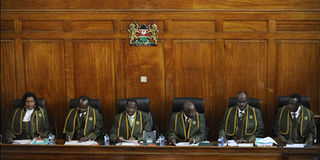Court orders scrutiny of all forms used in presidential election

PHOTO | BILLY MUTAI Chief Justice Willy Mutunga (third from left) leads the Supreme Court during the pre-trial conference on March 25, 2013. The court will on March 26 continue hearing submissions from lawyers representing various parties in the election petition filed by Cord presidential candidate Raila Odinga challenging the declaration of Jubilee’s Uhuru Kenyatta as winner of the March 4 presidential election. The other judges are (from left) Njoki Ndung’u, Jackton Ojwang’, Philip Tunoi, Mohammed Ibrahim and Smokin Wanjala.
What you need to know:
- Mutunga assures all parties that his team will deal with all cases fairly, without fear or ill-will
The Supreme Court has ordered the re-tallying of the presidential votes in 22 polling stations across the country.
In their first sitting to set the ground rules for determining three petitions challenging the outcome of the presidential elections, the six judges gave orders and strict deadlines by which the parties are to fulfil the court’s orders.
The judges also ordered a fresh scrutiny of all Form 34 used by the electoral commission in tallying the presidential votes in all the 33,000 polling centres across the country as well as the Form 36s used by the commission in entering presidential constituency results.
“There shall be a scrutiny of all forms used in tallying presidential results. The scrutiny shall be aimed at scrutinising all votes cast and the registered voters to establish the accuracy of comparing registered voters with votes cast,” ruled the judges.
All reports and results of various exercises must be filed with the court by 4pm on Wednesday.
Prime Minister Raila Odinga has challenged the Independent Electoral and Boundaries Commission’s (IEBC) declaration of Mr Uhuru Kenyatta as winner of the March 4 presidential elections. Mr Odinga argues in his application that some polling centres had more votes cast than registered voters and that the commission inflated the voter turn out to favour Mr Kenyatta.
The six judges — Chief Justice Willy Mutunga, Justices Philip Tunoi, Jackton Ojwang’, Mohammed Ibrahim, Smokin Wanjala and Njoki Ndung’u — began the pre-trial hearing with an assurance of justice for all parties.
Dr Mutunga, the court’s president, said the judges were alive to the competing expectations the people had placed on the six judges and that they were fully prepared physically, intellectually and psychologically for the task.
“We shall treat the petitions with objectivity and undertake a fair analysis of the evidence, the Constitution and the law. We shall render our judgment without fear or favour, devoid of ill-will or affection towards any cause that is partisan, unconstitutional or illegal,” the CJ said.
It was a day in which the judges allowed Attorney General Githu Muigai to be enjoined in the petitions, dismissed an application by Law Society of Kenya to be enjoined and postponed the decision of a similar application by Prof Yash Pal Ghai of Katiba Institute to this morning.
The AG in his application to be enjoined said the Constitution gives him power to defend public interest.
“My brief is not to support any side but to offer legal advice and bring experience from other jurisprudence to support the judges in making their decision,” he said.
He was allowed despite strong objections from Mr Odinga’s lawyer, Mr George Oraro, who said the petitions had not raised any complex legal issue requiring the AG’s advice.
The judges also allowed the consolidation of the three petitions challenging the presidential elections, ruling that Mr Odinga’s shall act as the lead file.
“Although the petition by Mr Moses Kuria raises distinctive legal issues, we are of the view that all be consolidated due to the time constraint,” they said.
The preliminary hearings became stormy when Mr Kenyatta’s lawyer, Mr Fred Ngatia, filed an application objecting to new evidence presented by Mr Odinga.
He submitted that the new 900-page affidavit had introduced an additional 122 constituencies where Mr Odinga claims the IEBC inflated the votes cast without giving them a chance to respond. He asked the court to expunge it from the list of evidences.
“Question is whether the court should allow new evidence filed out of time since there was a specific timeline for filing documents. The petitioner had no courtesy even to ask the court’s leave to file the additional affidavit,” he said.
Mr Oraro responded that the law does not limit a party from presenting anything supporting its case and blamed the IEBC for the delay in filing the affidavit.
“What we have done is an analysis of the documents IEBC provided. We discovered that the commission deducted other candidate’s votes in those constituencies and added to the other. How then can we be denied the chance to prove that 11,000 votes were deducted from Mr Odinga and added to Mr Kenyatta with the new discovered evidence?” asked Mr Oraro.
Mr Odinga’s application for a forensic audit of the IEBC electronic system was also met opposition from the lawyers representing Deputy President-Elect William Ruto, IEBC and its chairman Mr Issack Hassan.
The judges will give a ruling on the two issues today, as well as on an application by a voter, Mr Isaac Aluochier, who has sued the IEBC for accepting the nominations of five presidential candidates in the March 4 elections.




